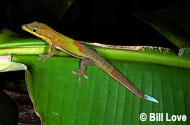Description:
This is an excellent choice for a pet day gecko! This attractive species is diurnally active in a well-planted terrarium and can provide years of pleasure watching it roam and feed. This is not a pet for handling, but rather for watching as one would an aquarium fish. They are nervous and fragile, so plan on enjoying the gold-dust day gecko from the outside of the glass. Put a moderate assortment of live plants with broad leaves in a gold-dust day gecko’s vivarium so it will learn to rest often where it can be easily observed. Pothos is a great choice, as is Sanseveria (snake plant) because it supports their negligible ‘bulk’ without collapsing. A piece of hollow bamboo is also recommended to provide a place to hide, which is a necessity if more than one gold-dust day gecko is housed in the same tank. Under no circumstances should more than one male share a cage or fighting will surely break out resulting in injuries. Offer small live insects such as sub-adult crickets and half-grown mealworms for most feedings, saving back pureed fruit (or baby food) once a week as a special treat. Gold-dust day geckos love baby food and will consume it day after day unhesitatingly, but it makes them fat if given very often. After a meal, gold-dust day geckos will often bask under a heat lamp for hours getting toasty warm to aid digestion. Laticauda lays eggs inside hollow logs, usually two at a time. They hatch in a couple months if left alone where laid in the cage at temperatures between approximately 70 to 90 degrees Fahrenheit, which is best for adult gold-dust day geckos too. The relative humidity should be kept high with periodic misting with an atomizer bottle, but avoid leaving the cage actually wet.
Habitat:
Moist to semi-arid forests, often at the edge zones with clearings
Range:
Northwestern Madagascar
Scientific Name: Phelsuma laticauda laticauda
Species Group: gecko
Family: Gekkonidae
Size: 4 to 6 inches
Level: beginner
Weight:
Dangerous: No


